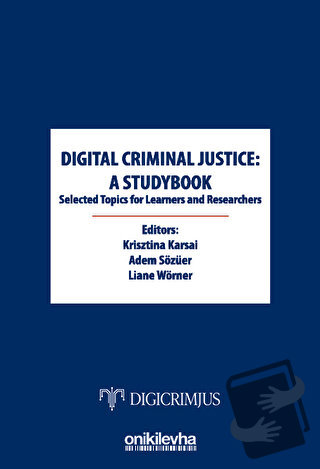Digital Criminal Justice: a Studybook Selected Topics for Learners and Researchers

The tools of the Digital Age have had profound impact on criminal law. Computer crimes, cyberterrorism, cyberwarfare, spyware, data breaches, intellectual property theft, identity fraud, regulation of cryptocurrencies in the context of financial crimes, invasive surveillance, the potential criminal responsibility of robots and AI systems, criminal activity in the deep web are just a few of the novel criminal law issues of our era. Notably, the possibility of machines exceeding the intelligence of humans challenges the basis of criminal law; the free human being. In addition to reconceptualization of substantive criminal law, digitalization has also brought about profound changes and challenges to procedural criminal law. Remote criminal proceedings, admissibility of digital or digitally-obtained evidence, criminal risk assessment tools based on AI, crime prediction tools, and electronic monitoring of offenders are just a few of the many new issues. It must also be noted that as much as digitalization has enabled the proliferation of crime and its variations, it has also provided new opportunities to combat crime through innovative developments in law enforcement and cooperation. This timely book aims to tackle these novel challenges to criminal law from a comparative perspective. Spanning a variety of substantive and procedural issues, it proposes solutions to the pressing issues of modern criminal law.
| Taksit Sayısı | Taksit tutarı | Genel Toplam |
|---|---|---|
| Tek Çekim | 97,75 | 97,75 |
| 3 | 35,61 | 106,82 |
| 6 | 18,80 | 112,79 |
| 9 | 13,20 | 118,78 |
| 12 | 10,39 | 124,74 |
| Taksit Sayısı | Taksit tutarı | Genel Toplam |
|---|---|---|
| Tek Çekim | 97,75 | 97,75 |
| 3 | 35,61 | 106,82 |
| 6 | 18,80 | 112,79 |
| 9 | 13,20 | 118,78 |
| 12 | 10,39 | 124,74 |
| Taksit Sayısı | Taksit tutarı | Genel Toplam |
|---|---|---|
| Tek Çekim | 97,75 | 97,75 |
| 3 | 35,61 | 106,82 |
| 6 | 18,80 | 112,79 |
| 9 | 13,20 | 118,78 |
| 12 | 10,39 | 124,74 |
| Taksit Sayısı | Taksit tutarı | Genel Toplam |
|---|---|---|
| Tek Çekim | 97,75 | 97,75 |
| 3 | 35,61 | 106,82 |
| 6 | 18,80 | 112,79 |
| 9 | 13,20 | 118,78 |
| 12 | 10,39 | 124,74 |
| Taksit Sayısı | Taksit tutarı | Genel Toplam |
|---|---|---|
| Tek Çekim | 97,75 | 97,75 |
| 3 | 35,61 | 106,82 |
| 6 | 18,80 | 112,79 |
| 9 | 13,20 | 118,78 |
| 12 | 10,39 | 124,74 |
| Taksit Sayısı | Taksit tutarı | Genel Toplam |
|---|---|---|
| Tek Çekim | 97,75 | 97,75 |
| 3 | 35,61 | 106,82 |
| 6 | 18,80 | 112,79 |
| 9 | 13,20 | 118,78 |
| 12 | 10,39 | 124,74 |
| Taksit Sayısı | Taksit tutarı | Genel Toplam |
|---|---|---|
| Tek Çekim | 97,75 | 97,75 |
| 3 | - | - |
| 6 | - | - |
| 9 | - | - |
| 12 | - | - |
The tools of the Digital Age have had profound impact on criminal law. Computer crimes, cyberterrorism, cyberwarfare, spyware, data breaches, intellectual property theft, identity fraud, regulation of cryptocurrencies in the context of financial crimes, invasive surveillance, the potential criminal responsibility of robots and AI systems, criminal activity in the deep web are just a few of the novel criminal law issues of our era. Notably, the possibility of machines exceeding the intelligence of humans challenges the basis of criminal law; the free human being. In addition to reconceptualization of substantive criminal law, digitalization has also brought about profound changes and challenges to procedural criminal law. Remote criminal proceedings, admissibility of digital or digitally-obtained evidence, criminal risk assessment tools based on AI, crime prediction tools, and electronic monitoring of offenders are just a few of the many new issues. It must also be noted that as much as digitalization has enabled the proliferation of crime and its variations, it has also provided new opportunities to combat crime through innovative developments in law enforcement and cooperation. This timely book aims to tackle these novel challenges to criminal law from a comparative perspective. Spanning a variety of substantive and procedural issues, it proposes solutions to the pressing issues of modern criminal law.










